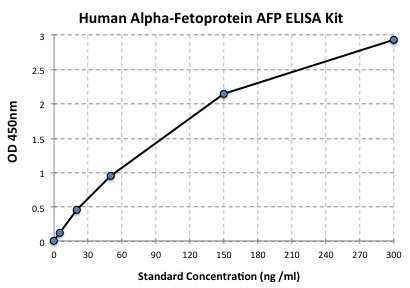More info
AFP is a major plasma protein produced by the yolk sac and the liver during fetal development. It is thought to be the fetal form of serum albumin. AFP binds to copper, nickel, fatty acids and bilirubin. AFP Plasma levels decrease rapidly after birth but begin decreasing prenatally starting at the end of the first trimester. Normal adult levels are usually achieved by the age of 8 to 12 months. The function of AFP in adult humans is unknown; however, in rodents it binds estradiol to prevent the transport of this hormone across the placenta to the fetus. The main function of this is to prevent the virilization of female fetuses. As human AFP does not bind estrogen, its function in humans is less clear. AFP can also be used as a biomarker to detect a subset of tumors in non-pregnant women, men, and children. A level above 500 ng/ml of AFP in adults can be indicative of hepatocellular carcinoma, germ cell tumors, and metastatic cancers of the liver.
Citation:
1. 张思宇, 曹娜, 陈明凯, 张立达, 白阳秋, 杨玉秀. FAT10 mRNA在肝癌和结肠癌患者血浆中的表达及诊断价值. 世界华人消化杂志 2015; 23(36): 5775-5783


